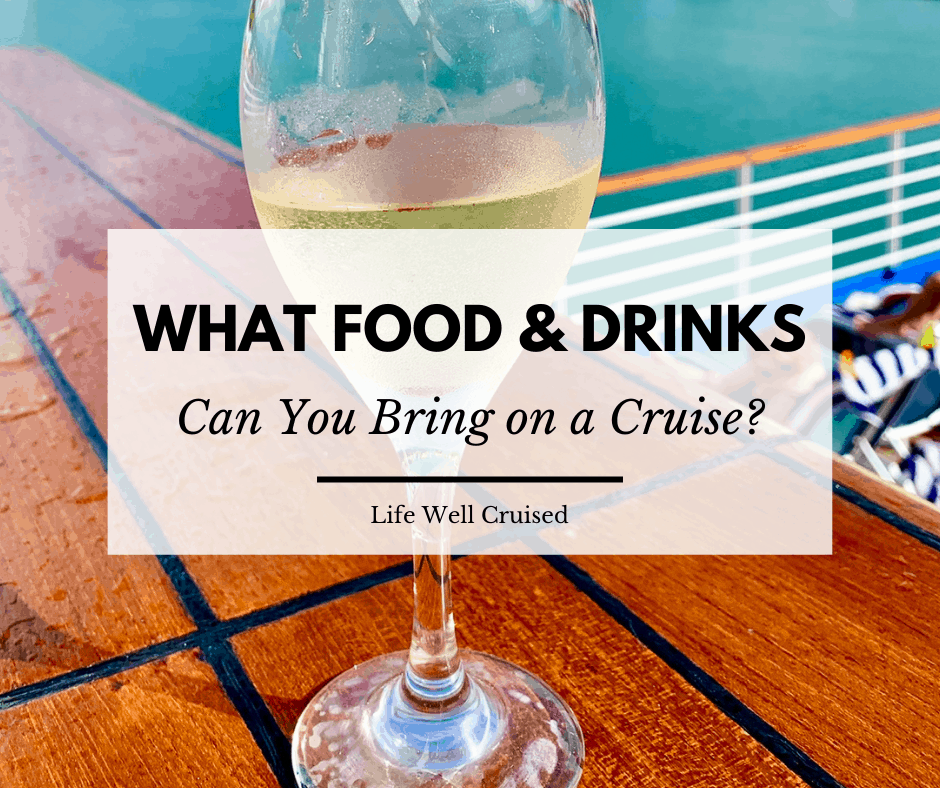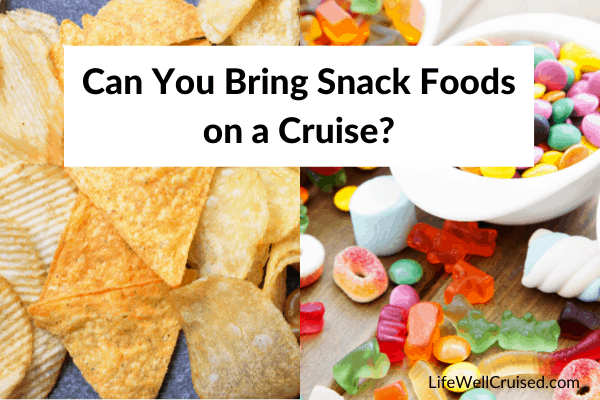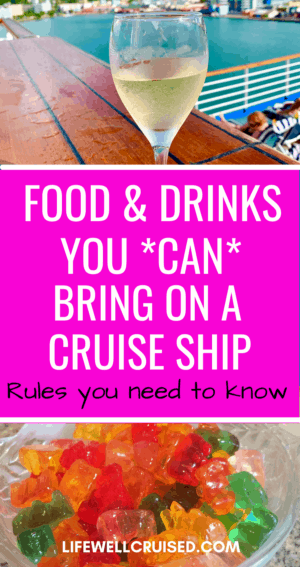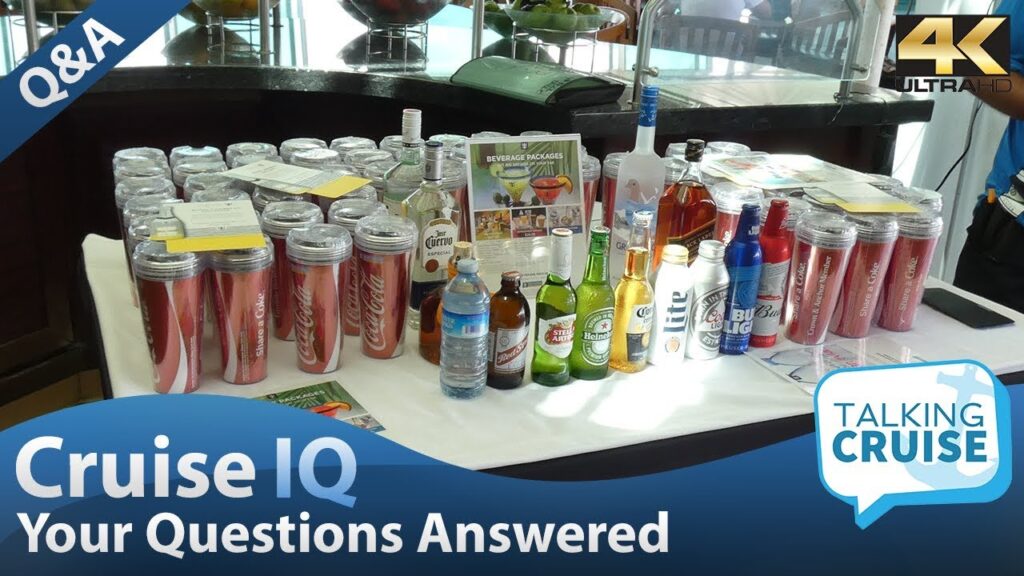Are you planning a cruise vacation and wondering if you can bring your own food and drinks on board? Well, the answer is…yes, you can! Many cruise lines allow passengers to bring a limited amount of non-alcoholic beverages and pre-packaged snacks with them. However, it’s essential to check the specific rules and restrictions set by your cruise line before packing your homemade sandwiches and favorite beverages. So, get ready to save some money and indulge in your favorite snacks while sailing the high seas!
What is the Cruise Policy on Bringing Food and Drinks?
Cruise lines have different policies regarding bringing food and drinks onboard. While most cruise lines allow passengers to bring non-perishable food items, there are restrictions and guidelines in place for perishable items and homemade food. Additionally, the policies on alcoholic beverages vary from one cruise line to another. It is important to familiarize yourself with the specific policies of your chosen cruise line to avoid any inconvenience or disappointment during your trip.
Cruise Lines’ Policies
Each cruise line has its own set of policies when it comes to bringing food and drinks onboard. Generally, cruise lines allow passengers to bring non-perishable food items such as pre-packaged snacks, granola bars, and canned goods. However, there are restrictions on bringing perishable items and homemade food due to health and safety concerns. Alcoholic beverages may also be subject to specific guidelines and regulations set by the cruise line.
Reasons for Restrictions
The restrictions on bringing certain food and drinks onboard are primarily for health and safety reasons. Cruise ships have health and sanitation protocols in place to prevent foodborne illnesses and maintain high hygiene standards. By regulating the types of food and drinks passengers can bring, cruise lines can control the potential risks associated with improper handling, storage, or consumption of perishable items. These restrictions aim to ensure the well-being of passengers and maintain the overall cleanliness and safety of the ship.
Exceptions to the Policy
While there are general policies and restrictions in place, there may be exceptions depending on the specific circumstances. For example, passengers with dietary restrictions or special medical needs may be allowed to bring certain food items onboard with prior approval from the cruise line. Additionally, infants may have different guidelines regarding the allowance of baby food and formula. It is recommended to contact your cruise line in advance to inquire about any exceptions or arrangements that can be made to accommodate your specific situation.
Bringing Non-Perishable Food Items
Non-perishable food items are generally allowed to be brought onboard without significant restrictions. These items are typically pre-packaged and have a longer shelf life, reducing the risk of spoilage. Examples of allowed non-perishable food items include pre-packaged snacks, canned goods, dry goods such as cereal or pasta, and sealed bottled beverages. However, it is important to note that any food brought onboard should be for personal consumption and not for resale or distribution.

This image is property of lifewellcruised.com.
Allowed Non-Perishable Food Items
When bringing non-perishable food items onboard, it is advisable to choose items that are easy to store, consume, and do not require elaborate preparation. Some popular choices include pre-packaged snacks like chips, cookies, or energy bars, as well as canned soups, fruits, and vegetables. Dry goods such as crackers, nuts, or instant noodles can also be convenient options. Remember to check the cruise line’s policy regarding specific food items to ensure compliance.
Packaging and Preparation Requirements
When bringing non-perishable food items, it is recommended to keep them in their original, unopened packaging. This helps maintain the integrity and hygiene of the food. If you prefer to transfer the items to a different container, make sure it is airtight, properly labeled, and still within its expiration date. Avoid repackaging food in non-food containers or bags that may cause confusion or contamination. It is also crucial to pack the food securely to prevent spillage or damage during transport.
Storage and Consumption Guidelines
Once onboard, non-perishable food items should be stored in your stateroom’s mini-fridge or in a cool, dry place. Avoid leaving perishable items exposed to heat or direct sunlight, as this can compromise their quality and safety. It is important to consume non-perishable food items responsibly and dispose of any leftovers properly. Remember that while bringing non-perishable food can be convenient, cruise ships offer a range of dining options that may suit your preferences and needs.
Bringing Perishable Food Items
Bringing perishable food items onboard a cruise ship is subject to more restrictions due to health and safety concerns. Cruise lines typically have strict guidelines to ensure the freshness and safety of food consumed on board. Perishable food items include fresh fruits and vegetables, dairy products, meats, and other items that require refrigeration to maintain their quality.
Perishable Food Restrictions
For the safety of all passengers, cruise lines generally do not allow passengers to bring perishable food items onboard. This is because proper refrigeration and storage facilities are necessary to maintain the freshness and prevent the risk of foodborne illnesses. The cruise ship’s onboard culinary team takes pride in providing a variety of delicious and safely prepared meals and takes all necessary precautions to ensure food safety.

This image is property of lifewellcruised.com.
Special Considerations for Dietary Restrictions
If you have dietary restrictions or special medical needs that require specific perishable food items, it is advisable to contact your cruise line in advance. In some cases, with prior approval, accommodations can be made to accommodate your dietary needs. It is important to provide the cruise line with detailed information about your specific requirements, including the type of food items needed and any supporting documentation from medical professionals, if applicable.
Guidelines for Packing and Handling Perishable Foods
While bringing perishable food items may not be permitted, it is essential to follow proper guidelines if exceptions are made or if the cruise line provides specific instructions. These guidelines may include the use of insulated coolers or containers, specific temperature requirements, and limitations on the quantity or type of perishable items allowed. It is crucial to adhere to these guidelines to ensure food safety and prevent any potential health risks.
Bringing Homemade Food
Bringing homemade food onboard a cruise ship is generally subject to stricter regulations. Cruise lines have stringent policies surrounding homemade food items due to safety concerns and the potential for food contamination. It is advisable to review the specific policies of your chosen cruise line regarding homemade food before packing any items.
Cruise Line Restrictions
Most cruise lines have policies that prohibit passengers from bringing homemade food items onboard. This includes items such as homemade baked goods, dishes, or meals prepared outside of a licensed food establishment. The restrictions are in place to ensure that all food consumed onboard meets the highest standards of safety and hygiene. It is important to respect these policies and make alternative arrangements to satisfy your dietary needs or preferences.
FDA Guidelines for Homemade Food
The U.S. Food and Drug Administration (FDA) provides guidelines for the production and handling of homemade food items. These guidelines are primarily focused on ensuring food safety and preventing the risk of foodborne illnesses. While the FDA guidelines are not directly applicable to cruise ship policies, they provide valuable information on best practices for homemade food preparation, including proper handling, storage, and labeling. It is essential to follow these guidelines when preparing food for consumption, even if it is not allowed onboard a cruise ship.

This image is property of lifewellcruised.com.
Alternative Options
If you have dietary restrictions or prefer homemade meals, there are alternative options available onboard most cruise ships. Many cruise lines offer a variety of dining options, including specialty restaurants and menus that cater to different dietary needs. These onboard dining options often provide a wide range of choices, allowing you to enjoy delicious meals prepared by professional chefs in a controlled and safe environment. It is advisable to explore the dining options offered by your cruise line to find alternatives that meet your preferences and requirements.
Bringing Alcoholic Beverages
The policies regarding bringing alcoholic beverages on a cruise ship can vary significantly among different cruise lines. Some cruise lines allow passengers to bring a limited amount of alcohol onboard, while others have strict regulations and prohibit any outside alcoholic beverages. It is crucial to familiarize yourself with your chosen cruise line’s policy to avoid any inconvenience or conflicts upon boarding.
Cruise Line Policies on Alcohol
Cruise lines have different policies and guidelines regarding the allowance of alcoholic beverages. Some cruise lines permit passengers to bring a limited quantity of sealed alcoholic beverages, such as a bottle of wine or champagne, for personal consumption in their stateroom. Other cruise lines strictly prohibit passengers from bringing any outside alcoholic beverages and strictly enforce this policy during embarkation.
Corkage Fees and BYOB Policies
For cruise lines that allow passengers to bring their own alcoholic beverages onboard, there may be specific regulations in place, such as corkage fees or “Bring Your Own Bottle” (BYOB) policies. Corkage fees typically apply when passengers wish to consume their own alcohol in public areas or specialty restaurants that charge for beverage service. BYOB policies may have limitations on the type and quantity of alcohol allowed, and the beverages are usually limited to consumption in the privacy of the passengers’ staterooms.
Customs and Duty Regulations
When bringing alcoholic beverages onboard, it is important to be aware of any customs and duty regulations that may apply to your specific travel destination. Customs regulations vary from country to country, and it is essential to comply with these regulations to avoid any legal issues. Some countries may have restrictions or require the payment of duties on alcohol brought into the country. It is advisable to research the customs regulations of your cruise itinerary and consult with the cruise line or relevant authorities for guidance.

This image is property of lifewellcruised.com.
Special Dietary Needs and Allergies
If you have special dietary needs or allergies, it is crucial to notify the cruise line in advance to ensure your requirements are accommodated. Cruise lines strive to cater to a wide range of dietary preferences and restrictions and can often provide appropriate alternatives or modifications to meet your needs.
Notifying the Cruise Line in Advance
To ensure that your special dietary needs or allergies are taken into consideration, it is recommended to notify the cruise line at the time of booking or as early as possible. This allows the cruise line’s culinary team to make necessary arrangements and provide suitable options during your trip. Providing detailed information about your specific requirements, including any allergies or intolerances, can help the cruise line better accommodate your needs and ensure a safe dining experience.
Options for Special Dietary Requirements
Cruise lines offer various options to cater to special dietary requirements. These may include gluten-free, vegetarian, vegan, kosher, or low-sodium menus. By notifying the cruise line in advance, you can request these specialized menus or communicate any specific dietary restrictions you may have. Many cruise lines have dedicated culinary teams and chefs trained in accommodating dietary needs, ensuring that you can enjoy meals that are both delicious and suitable for your dietary requirements.
Allergies and Restrictions
If you have allergies or restrictions, it is important to inform the cruise line about the specific allergens you need to avoid. This allows the culinary team to take the necessary precautions to prevent cross-contamination and ensure your safety. Cruise lines often have processes in place to handle food allergies, including separate preparation areas, allergen-free ingredients, and trained staff to assist in addressing your concerns. However, it is important to remember that as with any dining experience, there is always a potential for cross-contamination, and it is essential to communicate your needs clearly and take personal precautions.
Bringing Baby Food and Formula
If you are traveling with an infant and require baby food and formula, most cruise lines have policies in place to accommodate these needs. Cruise lines understand the importance of providing appropriate nutrition and convenience for families traveling with young children.

This image is property of i.ytimg.com.
Policies on Baby Food and Formula
Cruise lines generally allow passengers to bring a reasonable amount of baby food and formula on board. It is advisable to contact your chosen cruise line in advance to determine the specific guidelines and if any special arrangements need to be made. Some cruise lines may offer the option to pre-purchase baby food or formula and have it delivered to your stateroom, eliminating the need to pack large quantities for the duration of the trip.
Preparation and Packaging Guidelines
When bringing baby food and formula on a cruise ship, it is important to ensure that they are properly prepared and packaged. Follow the manufacturer’s instructions for preparation, including temperature control and appropriate storage. It is advisable to pack the baby food or formula in your carry-on luggage to have easy access during travel and embarkation. This allows you to maintain the freshness and quality of the products while complying with security regulations.
Exceptions for Infants
Cruise lines often make exceptions for infants and their specific needs. Some cruise lines may provide basic infant food and formula options onboard or have designated areas for preparing baby food. It is recommended to check with your cruise line in advance to inquire about any additional services or amenities available for infants. By providing the necessary information, you can ensure a comfortable and convenient experience for you and your baby during the cruise.
Benefits of Bringing Your Own Food and Drinks
Bringing your own food and drinks onboard a cruise ship can offer several advantages, including cost savings, personalized food preferences and restrictions, and a sense of familiarity and comfort.
Cost Savings
One significant benefit of bringing your own food and drinks is the potential for cost savings. Purchasing food and beverages on a cruise ship can be expensive, especially if you frequently dine at specialty restaurants or order alcoholic beverages. By bringing non-perishable items, snacks, or even a bottle of wine, you can enjoy your favorite treats without incurring additional costs.
Food Preferences and Restrictions
Bringing your own food gives you control over your dietary preferences and restrictions. Whether you follow a specific diet, have allergies, or simply prefer certain brands or flavors, having your own food ensures that you have access to the options you desire. This can be particularly beneficial for individuals with specific dietary needs who may not find suitable alternatives readily available onboard.
Familiarity and Comfort
Having familiar food and drinks available can provide a sense of comfort and ease during your cruise vacation. Being surrounded by new environments and experiences, having your favorite snacks or beverages can offer a touch of familiarity that adds to the overall enjoyment of the trip. It can also be reassuring to have easily accessible food options, particularly for those with young children or specific preferences.
Alternatives to Bringing Your Own Food and Drinks
While bringing your own food and drinks has its advantages, it is worth exploring the alternative options available onboard most cruise ships. Cruise lines offer a variety of dining options that suit different tastes and preferences.
Onboard Dining Options
Cruise ships typically have multiple dining venues, ranging from casual buffets to formal dining rooms and specialty restaurants. These dining options provide a diverse array of cuisines and menus to cater to various tastes. Whether you prefer international flavors, regional delicacies, or specific dietary choices, the onboard dining options can satisfy a wide range of preferences.
Dining Packages and Specialty Restaurants
For those seeking a more exclusive and personalized dining experience, many cruise lines offer dining packages or specialty restaurants. These specialty venues often feature renowned chefs, unique menus, and elevated dining experiences. While these options may come with an additional cost, they provide an opportunity to indulge in gourmet cuisine and create memorable dining moments during your cruise.
Room Service and Snack Bars
For added convenience and comfort, most cruise ships offer room service and snack bars. Room service allows you to enjoy meals and snacks in the privacy of your stateroom, perfect for late-night cravings or a relaxing breakfast in bed. Snack bars offer a variety of quick bites and refreshments throughout the day, ideal for grabbing a snack on the go or a casual meal by the poolside.
Tips for Bringing Your Own Food and Drinks
If you decide to bring your own food and drinks on a cruise, there are a few essential tips to keep in mind to ensure a smooth experience.
Check Cruise Line Policy in Advance
Before packing any food or drinks, thoroughly review the cruise line’s policy regarding bringing external items onboard. Policies may vary, and it is crucial to understand what is allowed and any restrictions or guidelines that must be followed. This will prevent any surprises or disappointments upon embarkation.
Follow Packing and Preparation Guidelines
For non-perishable food items, ensure that they are properly packaged, still within their expiration date, and securely packed to avoid any spills or damage. If you are allowed to bring perishable items or homemade food due to exceptional circumstances, carefully follow the cruise line’s guidelines for packing and handling these items to maintain food safety.
Consider Port Restrictions and Regulations
Keep in mind that some ports of call may have their own regulations and restrictions regarding the importation of food and beverages. Research the customs and duty regulations of your itinerary to avoid any legal complications or inconvenience. By planning ahead and being informed, you can enjoy your cruise and any port visits without any unnecessary complications.
In conclusion, each cruise line has its own policy regarding bringing food and drinks onboard. Non-perishable food items are generally allowed, while restrictions apply to perishable items and homemade food due to health and safety concerns. Alcoholic beverages policies vary, and it is crucial to familiarize yourself with specific guidelines. Cruise lines make accommodations for dietary needs and allergies, but it is important to notify them in advance. While bringing your own food and drinks may offer cost savings and personal preferences, there are alternative onboard dining options to explore. Finally, follow the cruise line’s policies and guidelines, and consider any port restrictions and regulations to ensure a smooth and enjoyable cruise experience.
Hi, I’m Mike, the author of Ocean Bliss Journeys. Thank you for visiting 🙂

